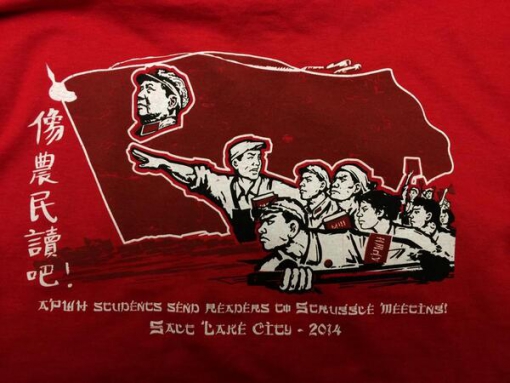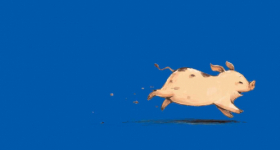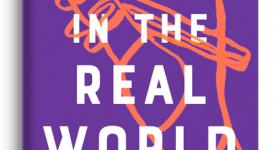
At the 2014 grading of AP World History exams in Salt Lake City, conducted by high school and college educators specializing in topics related to world history, the Educational Testing Service (ETS) and College Board leadership engaged in culturally insensitive and racist behavior toward Asians, particularly Chinese people. The images above are from the front and back of a t-shirt designed for readers by the leaders of the AP World History exam grading. The images allude to one of the essay questions on this year’s exam, a question about the Chinese Communist Party.
After Asian Americans and others pointed out that the shirt design was offensive, the director of ETS’s Human Resources department agreed that it should be altered. But she later changed her mind, deeming it “not offensive,” and approved it for printing and distribution. It was subsequently purchased by hundreds of high school teachers and college professors who were in Salt Lake City for the reading.
Sadly, many AP World History teachers and academics who were grading exams this year were not put off by this racist imagery. Hundreds of educators purchased this shirt and wore it on the last day. It is deeply disturbing that people who teach World History could be so indifferent to racial and cultural insensitivity.
This t-shirt is just one of many instances of cultural insensitivity directed at Asian Americans during the week-long grading. At orientation on the first day, the AP World History exam’s Chief Reader made a handful of jokes regarding the Tiananmen Square massacre, while wearing a Red Guard cap. These remarks made light of the image of the Tiananmen Square “tank man”: “You don’t want to be THAT guy!”
Exam readers were also shown an image of the back of the commemorative t-shirt as a preview, to entice people to order the shirt. After some readers complained about the inappropriate and unprofessional remarks as well as the t-shirt design, the Chief Reader made an apology to everyone on-site. He read a short statement in which he apologized for people being under the “impression” that the orientation was culturally insensitive and inappropriate. Rather than ameliorate a hurtful situation, the apology made the Chief Reader into the victim, and rallied support for him against ETS and the “person” that complained to ETS—when in fact a number of people had complained.
Despite assurances from ETS that the t-shirts would be redesigned, they were distributed at the end of the week without any changes. The front of the t-shirt, which had not been shown on the first day, was the most offensive: images of past leaders of the Chinese Communist government were depicted as “yellowface” caricatures with exaggerated physical features.
The racist image on the front of the shirt, combined with the “comical” and stereotypically “Asian” font on the back of the shirt, implies that the World History community believes it is acceptable to mock Asian people and cultures for laughs. Certainly the t-shirt and events at the reading are violations of ETS work policies regarding harassment. They created a hostile work environment by singling out and mocking a single racial group. The event and leaders’ response to criticism clearly demonstrates the need for educators and academics alike to be more conscious of racial and cultural insensitivity, and for Asian Americans to be more vocal when confronted with racism.
After this event, a graduate student wrote a letter of complaint that has been sent to ETS’s Director of Human Resources. Feel free to let ETS and the College Board know that this was unacceptable by contacting them here:
College Board website contact form
On Twitter: @valueofhighered (ETS Director of External Communications) and @AP_Trevor (Trevor Packer, College Board’s Head of AP)
Editor's Note: On Friday, June 27, in response to public criticism of the culturally offensive actions and remarks that took place at the 2014 AP World History exam grading, ETS and the College Board published a joint statement:
Educational Testing Service (ETS) and the College Board have learned of culturally offensive actions during the AP® World History Reading in June 2014. We are outraged by these intolerable findings and are dedicated to preventing any such activities in the future.
As an annual tradition, teachers and professors who attend the AP Reading make independent decisions to create and sell themed T-shirts to their peers. Neither ETS nor the College Board has any involvement in the creation, distribution, or sale of these T-shirts. This year, the T-shirt and some comments made at the AP World History Reading were both culturally and racially insensitive. College Board officials were notified of these incidents after the AP World History Reading was over and the teachers had dispersed.
It is unacceptable that one of the AP Exam Readers created a T-shirt that mocked historical events that were the cause of great pain and suffering, and promulgated racist stereotypes that further marginalize a racial minority. Furthermore, it is entirely inappropriate that references to the AP Program were combined with language and images that make light of a deeply tumultuous period in Chinese history. When some teachers expressed their concerns, others hastily dismissed such perspectives, and proceeded to distribute the T-shirts regardless. All of this was a clear violation of the high standards for respect and dignity that we require and expect at the AP Reading, and ETS and the College Board are deeply apologetic for the distribution of the T-shirt and for the toxic environment it created.
As a result of these findings and the unquestionably poor judgment they reveal, the College Board has asked ETS to discipline any responsible individuals. In addition, we will convene opportunities for the AP World History community to reflect on these circumstances and reestablish the collegiality the AP community expects and deserves.
***
Hannah Kim is an Assistant Professor of History and Co-Coordinator of Social Studies Education at the University of Delaware. Her research and teaching interests include diversity in teacher education, world history curriculum, and U.S. and Korean relations.









Comments